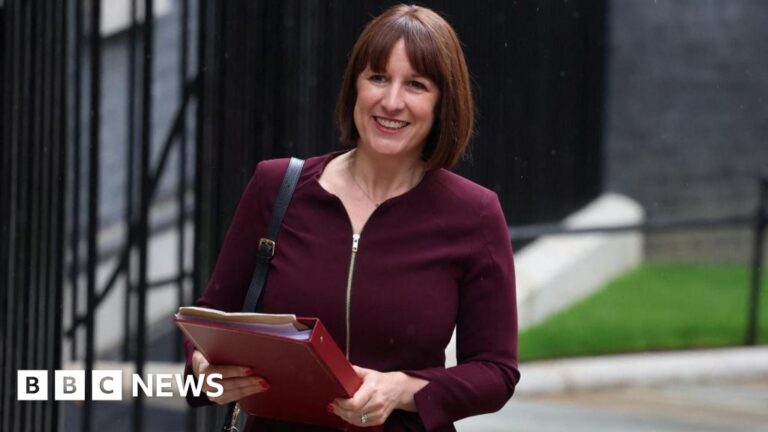- Author, Faisal Islam and Charlotte Edwards
- Role, BBC News
-
Rachel Reeves will pledge to make reviving economic growth a “national mission” in her first speech as chancellor.
Speaking to Treasury business leaders later, Ms Reeves will set out Labour’s plan for the economy and declare that the era of “chaos and irresponsibility is over”.
She is also expected to announce that she will reinstate mandatory housebuilding targets, as part of an overhaul of Britain’s planning rules.
And she will say that with the political turmoil in France and the United States, Britain has now once again become one of the most stable places for international investment.
She and her team have been working all weekend on this speech, addressed to business leaders and investors who have held off investing in Britain in recent years because of the political chaos of the post-Brexit years and Liz Truss’ mini-budget.
Ms Reeves is expected to announce an immediate easing of planning red tape that is holding back construction, infrastructure and the energy grid.
This will be done in the hope that investors will unlock tens of billions of pounds of investment in green industry and housebuilding.
Mandatory housing construction targets are also expected to return.
A moratorium on onshore wind power is set to be lifted and additional funding will be allocated to hundreds of new planning officers.
She told the BBC on Friday that she was “ready to fight” with those who have delayed and rejected housebuilding and infrastructure investment in the planning system.
On Monday morning, she will tell business leaders: “Last week, the British people voted for change. And in the last 72 hours, I have begun the work needed to deliver on that mandate.”
“Our manifesto was clear: ‘Sustained economic growth is the only way to improve the prosperity of our country and the standard of living of workers.
“Where previous governments have been unwilling to take tough decisions, I will take them. This is now a national mission. There is no time to lose.”
The Chancellor is also expected to claim, based on new Treasury analysis, that the UK economy is £140bn smaller than if it had grown at the same rate as other advanced economies.
She is expected to add: “This could have generated an extra £58 billion in tax revenue last year alone to support our public services.
“It is up to this new government to repair the foundations.”
She will not yet announce new tax and spending measures.
She will meet the Office for Budget Responsibility this week, and a budget and spending review is planned for the autumn. She also met the governor of the Bank of England on Friday.
During the election campaign, Labour focused primarily on managing housing supply, with a promise to build 1.5 million homes in the next parliament.
Supporters of mandatory housing targets say they are needed to ensure councils build the required number of homes.
Opponents, however, say the mandatory approach has been tried unsuccessfully for decades and risks forcing development onto greenfield sites against the wishes of local residents.
Roger Mortlock, chief executive of CPRE, the rural charity, said there was some question as to whether the green belt was the right place to start building “when it is still an idea that has huge public support”.
Speaking on the BBC’s Today programme, he said the CPRE argued that cities were the best places for housing because they already had the necessary infrastructure.
“The idea that the green belt has not been touched [under] “The last government is wrong: around six to ten thousand homes a year have been built on greenfield sites in the green belt since 2009,” he said.
“Very often they create car-dependent communities that take over the green belt and do nothing for the people who live there.”


